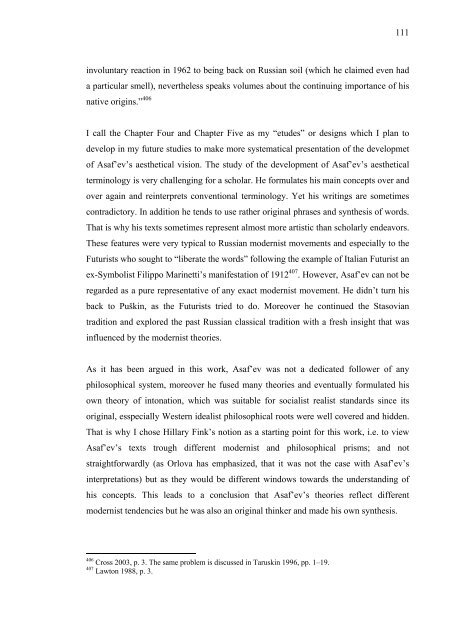Boris Asaf'ev and the Soviet Musicology - E-thesis
Boris Asaf'ev and the Soviet Musicology - E-thesis
Boris Asaf'ev and the Soviet Musicology - E-thesis
Create successful ePaper yourself
Turn your PDF publications into a flip-book with our unique Google optimized e-Paper software.
111<br />
involuntary reaction in 1962 to being back on Russian soil (which he claimed even had<br />
a particular smell), never<strong>the</strong>less speaks volumes about <strong>the</strong> continuing importance of his<br />
native origins.” 406<br />
I call <strong>the</strong> Chapter Four <strong>and</strong> Chapter Five as my “etudes” or designs which I plan to<br />
develop in my future studies to make more systematical presentation of <strong>the</strong> developmet<br />
of Asaf’ev’s aes<strong>the</strong>tical vision. The study of <strong>the</strong> development of Asaf’ev’s aes<strong>the</strong>tical<br />
terminology is very challenging for a scholar. He formulates his main concepts over <strong>and</strong><br />
over again <strong>and</strong> reinterprets conventional terminology. Yet his writings are sometimes<br />
contradictory. In addition he tends to use ra<strong>the</strong>r original phrases <strong>and</strong> syn<strong>the</strong>sis of words.<br />
That is why his texts sometimes represent almost more artistic than scholarly endeavors.<br />
These features were very typical to Russian modernist movements <strong>and</strong> especially to <strong>the</strong><br />
Futurists who sought to “liberate <strong>the</strong> words” following <strong>the</strong> example of Italian Futurist an<br />
ex-Symbolist Filippo Marinetti’s manifestation of 1912 407 . However, Asaf’ev can not be<br />
regarded as a pure representative of any exact modernist movement. He didn’t turn his<br />
back to Puškin, as <strong>the</strong> Futurists tried to do. Moreover he continued <strong>the</strong> Stasovian<br />
tradition <strong>and</strong> explored <strong>the</strong> past Russian classical tradition with a fresh insight that was<br />
influenced by <strong>the</strong> modernist <strong>the</strong>ories.<br />
As it has been argued in this work, Asaf’ev was not a dedicated follower of any<br />
philosophical system, moreover he fused many <strong>the</strong>ories <strong>and</strong> eventually formulated his<br />
own <strong>the</strong>ory of intonation, which was suitable for socialist realist st<strong>and</strong>ards since its<br />
original, esspecially Western idealist philosophical roots were well covered <strong>and</strong> hidden.<br />
That is why I chose Hillary Fink’s notion as a starting point for this work, i.e. to view<br />
Asaf’ev’s texts trough different modernist <strong>and</strong> philosophical prisms; <strong>and</strong> not<br />
straightforwardly (as Orlova has emphasized, that it was not <strong>the</strong> case with Asaf’ev’s<br />
interpretations) but as <strong>the</strong>y would be different windows towards <strong>the</strong> underst<strong>and</strong>ing of<br />
his concepts. This leads to a conclusion that Asaf’ev’s <strong>the</strong>ories reflect different<br />
modernist tendencies but he was also an original thinker <strong>and</strong> made his own syn<strong>the</strong>sis.<br />
406<br />
Cross 2003, p. 3. The same problem is discussed in Taruskin 1996, pp. 1–19.<br />
407<br />
Lawton 1988, p. 3.

















